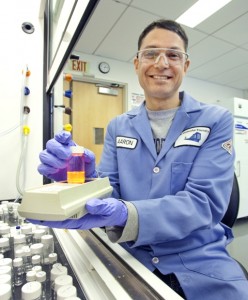
Berkeley Lab post-doctoral researcher Aaron Albers is an E.O. Lawrence Fellow working at the Molecular Foundry. He is developing nanoscale thermometers that could one day be used to map normal and cancerous cells. (Photo by Roy Kaltschmidt, Berkeley Lab Public Affairs)
Aaron Albers’ laboratory space is in perfect order. Dozens of white-capped sample vials span the length of a chemistry fume hood, all neatly lined up in rows. Each vial holds fluorescent nanoparticles Albers is studying for use as a potential “nanothermometer”—a temperature gauge so sensitive it can detect hot and cold parts of a biological material. If these nanothermometers could be put into cells, they might serve as a tool to differentiate between cancerous cells and normal ones.
Albers is a 2010 recipient of the Ernest Orlando Lawrence Fellowship, which recognizes outstanding individuals from historically underrepresented groups in emerging scientific research fields and provides 50 percent of the recipient’s salary for up to three years.
A post-doctoral fellow at Berkeley Labs’ Molecular Foundry, the exuberant Albers says he is driven by understanding fundamental mechanisms in cancer—“a massive, complex problem that’s hugely challenging, and yet allows for truly high-risk, high-reward science.”
Unlike the typical science prodigy-turned-superstar, Albers’ path to the laboratory was anything but pedestrian. Born and raised in the small town of Aberdeen, South Dakota (E.O. Lawrence was from Canton, SD), Albers is of Native American Chippewa descent. As the eldest son, he followed in his family’s tradition of enlisting in the military after graduating from high school in 1991. Hoping to see the oceans of the world “without shooting anyone,” Albers joined the Navy. After training, Albers served two tours of duty in Operations Desert Shield and Southern Watch on the U.S.S. Callaghan DDG-994, a guided missile destroyer. A Persian Gulf War Era Veteran at age 19, Albers then spent three years in his homeport of San Diego, CA as a Naval Search and Rescue Swimmer Instructor, teaching others how to rescue pilots and other Navy personnel thrown off aircraft carriers.
In the evenings, Albers attended San Diego City College, where he was introduced to the power of organic chemistry and chemical synthesis through instructor Carl Hoeger, who inspired Albers to major in chemistry and biochemistry at UC San Diego. Eager to gain research experience, Albers thrived in the oncology division at pharmaceutical giant Pfizer, where the “competitive, aggressive environment,” coupled with a dedication to cancer research, suggested he was ready to take on the rigors of graduate school.
He dropped anchor in UC Berkeley’s chemistry department in 2004, studying small-molecule chemistry of fluorescence dyes with advisor Chris Chang. “As one of my first graduate students, Aaron was a key player in initiating our lab’s efforts to create and apply new chemical tools to understand the contributions of oxidation biology to human health, aging, and diseases ranging from neurodegenerative Alzheimer’s to cardiovascular disorders to cancer,” said Chang, a professor of chemistry at UC Berkeley. Along with his advisor Chang, Albers lauds Foundry Director Carolyn Bertozzi for triggering his interest in the role of chemistry in understanding mechanisms in cellular and molecular biology. “Her charisma is the reason I came to Berkeley.”
Now, as a Lawrence Fellow at the Molecular Foundry, Albers is applying his knowledge to nanoscience research, exploring an intrinsic link between temperature and cancer.
“All of biology has a temperature component,” said Albers. “How do we build temperature sensors small enough to go into cell tumor environments and then compare these with regular cells as a function of temperature?”
Albers and his colleagues are studying nanoparticle-based sensors to understand basic biological processes in cancer. Albers hopes to place these nanoparticle sensors, which are roughly the size of proteins, into a living cell, and then map their fluorescence properties as a function of temperature. Depending on the resultant heat profile, these cells could then be tagged as cancerous or normal.
If this goal weren’t daunting enough, Albers is particularly interested in tracking the cancer with the lowest survival rate—brain tumors. “Your brain is what makes you who you are,” says Albers. “If there were a way to diagnose this disease earlier, using this temperature-based approach, we’d have a better chance at survival.”
“In the military, there is one way to fold a shirt, or make a bed—no detail is too small. I apply these principles in designing an experiment—what some might call a relentless pursuit of perfection,” says Albers, laughing. “I approach science with humility. I am willing to do the hard, detail-oriented work if it means somebody doesn’t have to suffer.”
Albers’ unwavering drive and penchant for particulars has served him well in research settings, qualities his Foundry mentors Brett Helms, Bruce Cohen and Caroline-Ajo Franklin commend.
“Aaron is among the most conscientious, thorough researchers I’ve met,” said Bruce Cohen, a staff scientist in the Biological Nanostructures Facility at the Foundry. “It’s been a long road for him to get here, and it’s clear he loves his work.”
Albers chose to come to the Foundry because of the Lab’s reputation for excellent science and commitment to diversity. “As a Native American, I know I’m a role model and I want to do something to encourage more diversity, change how people think about science, and break down these artificial delineations of how science is done and who is running science.”
“Aaron’s creative input and dedication to the Foundry’s collaborative projects are a testament to his drive to develop new nanoscale tools to understand and direct complex processes in cells,” said Brett Helms, a staff scientist in the Organic Nanostructures Facility at the Foundry. “I think we have much to look forward to from his unique perspective in nanoscience.”
Berkeley Lab is a U.S. Department of Energy (DOE) national laboratory located in Berkeley, California. It conducts unclassified scientific research and is managed by the University of California for the DOE Office of Science. Visit our Website at http://www.lbl.gov.
Additional Information
For more about Berkeley Lab’s Molecular Foundry visit http://foundry.lbl.gov/